Issue #13 - “DEAD AND ALIVE: BEING WITH ANCESTORS” Part I
Issue #13, September 2021
TABLE OF CONTENTS
Lise Weil, Kristin Flyntz, Azul Thomé, Sharon Simone, Redwing Keyssar, Miriam Greenspan, Melissa Kwasny, Marcia Weese
Editorial Conversation
Azul Thomé
Being with Ancestors
Sharon Simone
The Summoning
Kristin Flyntz
Gathered by Elders
Melissa Kwasny
Poetry by Sheryl Noethe, M.L . Smoker, Sandra Alcosser, J.I. Kleinberg, Ysabel Y. Gonzalez, Mariana McDonald
Redwing Keyssar
Gift from the Ancestors: My Work as an RN/Midwife to the Dying
Cheryl Potts
Soul Companions
Miriam Greenspan
There is no Light so Bright as that which Shines from the Darkness
Marcia Weese
Above/Below: Monographs and Etchings
DREAMS AND VISIONS
Deena Metzger, Sharon English, Andrea Mathieson, Larissa Lai, Shirley Graham, Patricia Robertson, Sangita Iyer, Catherine Bush, Lise Weil
Darkness as a Field of Being
Melissa Kwasny
Poetry by Sheryl Noethe, M.L . Smoker, Sandra Alcosser, J.I. Kleinberg, Ysabel Y. Gonzalez, Mariana McDonald
Melissa Kwasny, Poetry Editor
In these precarious times, when so many of us have lost, and are losing, so much, whether beloved people, animals, plants, or the earth as we know it, it seems appropriate for Dark Matter’s latest issue to be devoted to ancestors: naming them, grieving them, and remembering them, which is one of the holy tasks of the living. We are all, in this sense, as J.J. Kleinberg says in her visual poem, “strangers in common.” The poems offered to you here, in their courage to face and honor the dead, in their ritualistic and incantatory use of language and syntax, in their unanticipated access and attention to the interior from which both grief and memory come, seem to me particularly valuable to this moment.
Sheryl Noethe
skull as lantern
Cold didn’t bother us we lay there all night
moving through this incarnation into sand, or glass
I perfumed her and sang in her neck
It was not yet light when her breathing
hoarsened and when the bliss took her away
I wrapped her in white linen blankets
carried her onto the long boat
pushed it in the water and set it afire
sailing in the wind toward Valhalla
But first there were a number of events:
gravity gently smoothed her face and her skin cooled
she paled and became the same color as the sheets
white light blasted from behind her closed eyes
She became the women of every generation
I could see them in her bones
she took me back to the Norse goddess
whose skull she gave me
made from her own teeth
lantern of evolution
only available at the dying
Notes:
My mother and I struggled mightily for most
of my life. When my father died she became vulnerable
and available, and we spend many nights and later
afternoons face to face in her bed. The night
she passed was monumental in my experience.
She changed and cooled and I held her in my arms.
As her face changed I could see one thousand
Norse women in her luminous passing. She introduced
me to life and also to death.
Bio:
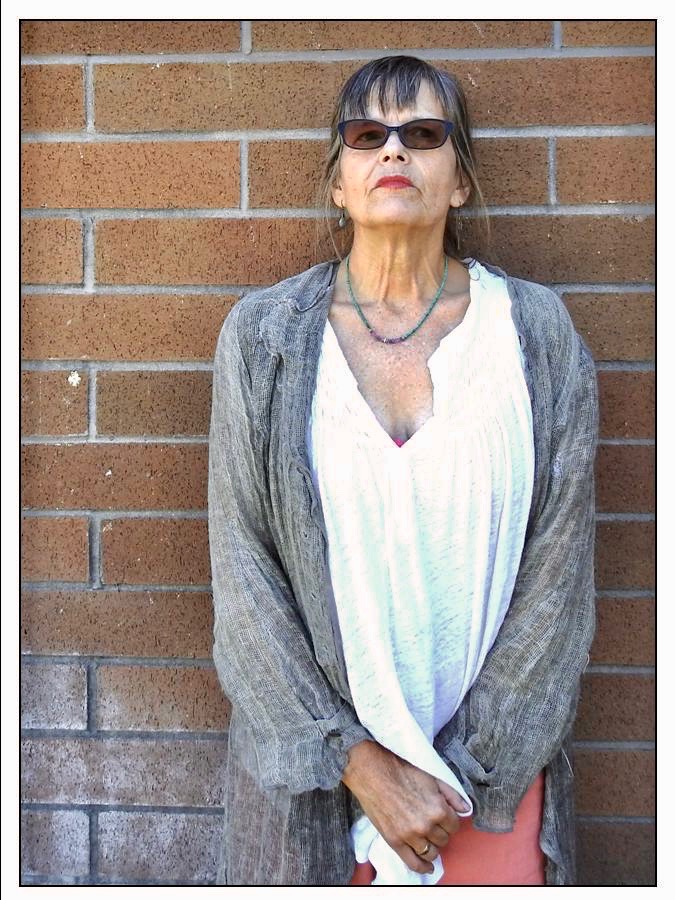 I was born afraid and stayed that way for a long time.
I was born afraid and stayed that way for a long time.
Hiding in closets with books was my real world.
Poetry gave me a life I’d never imagined.
I’ve published five collections of poetry and one
teaching text. I founded and serve as Artistic Director
of The Missoula Writing Collaborative, and was
Montana’s poet laureate from 2011-2013.
I am assembling a new manuscript named
“The Science of Co-incidence.”
I’m honored to be a contributor to this journal.
M.L. Smoker
The Book of the Missing, Murdered and Indigenous–Chapter 1
—For Natalie Smoker
The winding cord of highways, unkempt
gravel roads and the trails of animals–
a record of who and what has passed over,
an agony of secrets.
In the end, they have all borne witness,
eyes like glass beads that can never blink.
The dull light of motel neon shines ominously.
An engine growls across the landscape.
Brittle men who are splintered like glass
thrown from a second story window
and we are the room they leave behind.
They are pathetic husks, feeble in spirit.
Fragments fall along fields and shallow ditches,
in overlooked alleyways or underpasses.
A cold, empty breeze rising from the debris.
The first and last moment of her.
It is rage that pulls her up from this place.
She spews out the wretched and miserable
as particles of dawn-lit soil illuminate her skin.
Her hair is a two-edged sword.
She stitches together the collective story of origin,
her body a map: descended from the stars,
on the backs of animal sisters,
carried to safety in a bird’s beak.
This poem was originally published in Living Nations, Living Words, edited by U.S. Poet Laureate Joy Harjo (W.W. Norton & Company 2021).
Notes:
Writing “Book of the Missing…” was an incredibly difficult journey for me. The impact these circumstances have on Native communities runs deep and has impacted so many people I know, including my own family last year. I wanted to try to find a way to return power. To bring back the essence of who these people are. And to let them know we will never forget.
Bio:
 M.L. Smoker is a citizen of the Fort Peck Assiniboine and Sioux Tribes. Her family’s home is on Tabexa Wakpa. She is the author of a collection of poetry, Another Attempt at Rescue. She earned an Emmy for her work on the PBS documentary Indian Relay and in 2019 she was named to a two-year term as one of two poets laureate for the state of Montana.
M.L. Smoker is a citizen of the Fort Peck Assiniboine and Sioux Tribes. Her family’s home is on Tabexa Wakpa. She is the author of a collection of poetry, Another Attempt at Rescue. She earned an Emmy for her work on the PBS documentary Indian Relay and in 2019 she was named to a two-year term as one of two poets laureate for the state of Montana.
Sandra Alcosser
Looking for Her
Leaves newly fallen, did her head dust them?
Tips of fireweed bitten and bitten
Bits of fat and fur, lean and feather
Fragments of an absence not really there—
To find a mother on the planet
Read the clouds that hang above it
Ride down the shadblow and sallies
Become a body grazing on its knees
Looking for her, I kneel down this way
Inhale the coppery sheen below my face
Sniff deeply into a print, then twigs
Where the scent passed, tearing spiders’ rigging—
Without proper instinct to follow
Thoughts rush over, wrap her in shadow
Animal
I’d become one who knew the weight
Of silence by its breath, its press and length
Furtive shy being who sleuthed
The night in search of what remained aloof
Call down the animals, draw deeply
Into furrows, know reedy from grassy
July in the canyon I flick on a light
Inside the tent and begin singing –Outside
The canvas wall, something breathes against me
Then bark at the silhouette of my body
An elk has calved below, beside the creek
Under an arch of branches, escaped up scree
With gashes more than tracks where hooves tore moss
From rock, then left behind a deeper hive of darkness
Tremble
Is she what you looked for? What if you don’t know—
Motherless — does that frighten you most?
Tremble tree, quaker leaf, shepherds carved bodies<
On aspen bark to express their lonely
Nights they danced this grove, its soft cavities
Nights the grove danced upon their bodies
Its rich forest floor of grasses and forbs
Lupine and snowberry, lambsquarters
Thrilling consciousness of Persephone
Female buds crowd together, sticky
Leaf hoppers cast transparent shadows through green
Caterpillars stretch frameworks of silk skeins
Up and down the branches a grove shimmies
Bathes in the sweetness of each other’s honey
Marrow
Imagine flesh so thin that even clothed
Marrow remains visible within bone
How many nights search for someone wiser
stronger , before I come upon her —
An old woman in an inflatable
Yellow raft, a small turquoise lake
Full moon dimpled water of fish rising
To a new hatch and snapping night
Hawks – a woman who cares no longer
For worldly matters , and waiting for her
On shore, a pack animal, a llama
The one they call the little camel
Beside the fire where they will eat dinner
Its four soft pads splayed like ballet slippers.
Notes:
Simone de Beauvoir writes of her father in A Very Easy Death: I had stayed by him until the time he became a mere thing to me: I tamed the transition between presence and the void. With my mother’s death, it was not the transition but the void that needed to be tamed, and though it’s been sixteen years, I doubt I’ll ever be successful. Looking for Her is a sonnet sequence that began when, in the mirror, I saw clearly my departed mother and her sisters, and knew, only by touching my own face would I be close to them again. We survive as mammals because of the nurture of a mother or someone who assumes that role, and the cosmos and everything in it is our first true ancestor. We arrive as a gift from the animals, plants, minerals from which others before us have evolved. In addition to literary scholars, I work with wildlife biologists, and they inform the empirical path of what has proven to be a late-life adventure in the art of detection.
Bio:
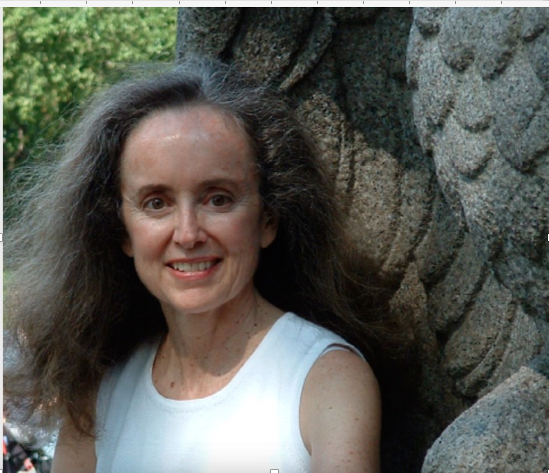 Sandra Alcosser’s poems have appeared in The New Yorker, The New York Times, Paris Review, Ploughshares, Poetry and the Pushcart Prize Anthology.She received two individual artist fellowships from National Endowment for the Arts, and her books of poetry, A FISH TO FEED ALL HUNGER and EXCEPT BY NATURE, received the highest honors from National Poetry Series, Academy of American Poets and Associated Writing Programs, as well as the Larry Levis Award and the William Stafford Award for Poetry. Her four artist book collaborations with Brighton Press have been exhibited internationally and reside in museums and special collections including The National Museum of Women in the Arts and Musee d’art Americain Giverny. She was the National Endowment for the Arts’ first Conservation Poet for the Wildlife Conservation Society and Poets House, New York, as well as Montana’s first poet laureate and recipient of the Merriam Award for Distinguished Contribution to Montana Literature . She founded and directs SDSU’s MFA each fall and edits Poetry International.
Sandra Alcosser’s poems have appeared in The New Yorker, The New York Times, Paris Review, Ploughshares, Poetry and the Pushcart Prize Anthology.She received two individual artist fellowships from National Endowment for the Arts, and her books of poetry, A FISH TO FEED ALL HUNGER and EXCEPT BY NATURE, received the highest honors from National Poetry Series, Academy of American Poets and Associated Writing Programs, as well as the Larry Levis Award and the William Stafford Award for Poetry. Her four artist book collaborations with Brighton Press have been exhibited internationally and reside in museums and special collections including The National Museum of Women in the Arts and Musee d’art Americain Giverny. She was the National Endowment for the Arts’ first Conservation Poet for the Wildlife Conservation Society and Poets House, New York, as well as Montana’s first poet laureate and recipient of the Merriam Award for Distinguished Contribution to Montana Literature . She founded and directs SDSU’s MFA each fall and edits Poetry International.
J. I. Kleinberg
Five Visual Poems
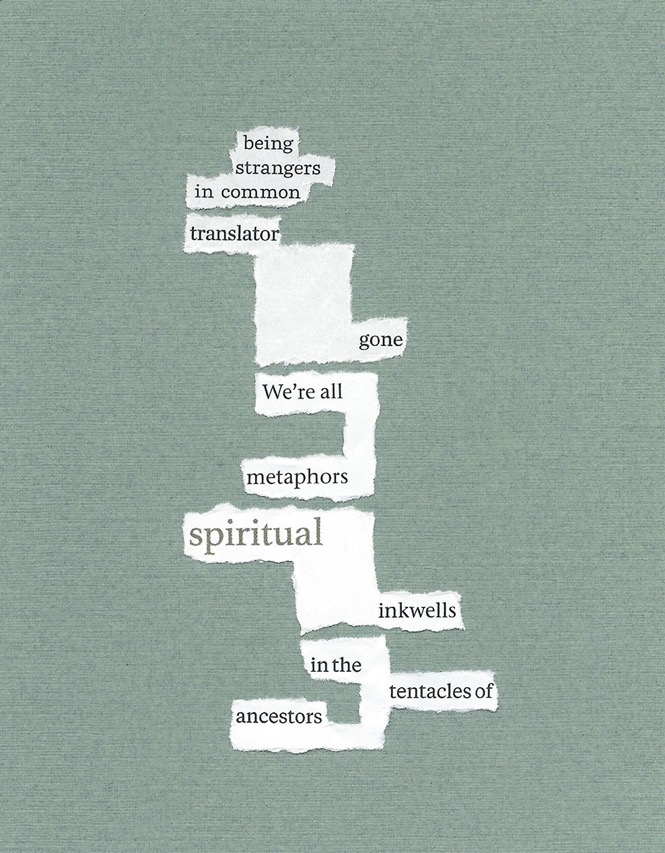
being strangers
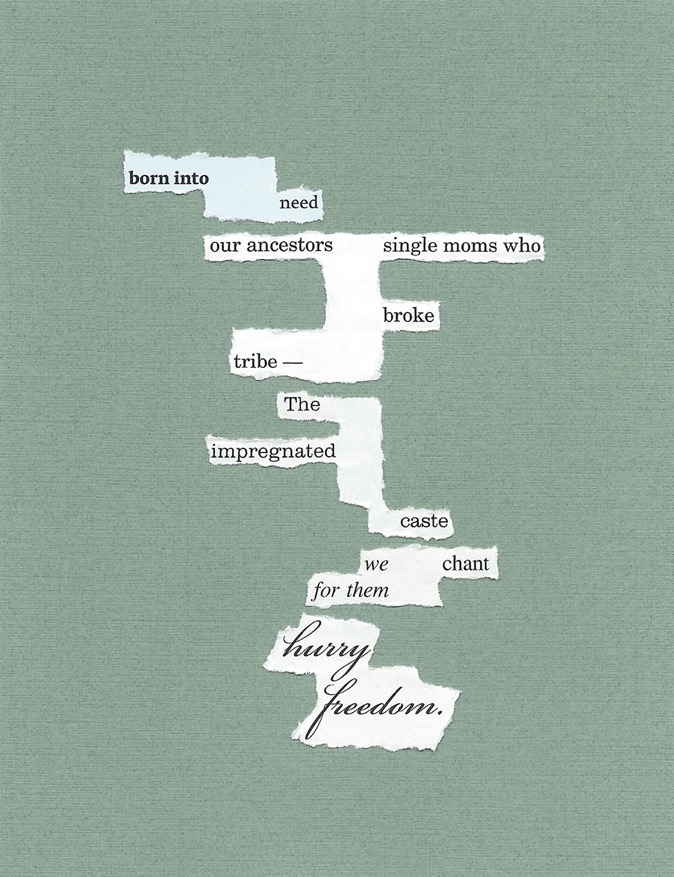
born into need
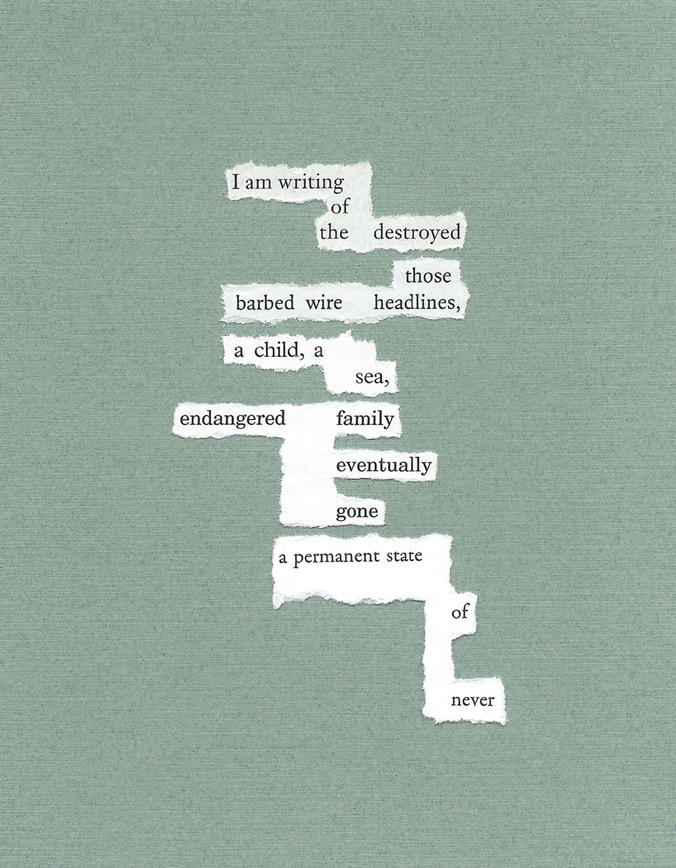
I am writing
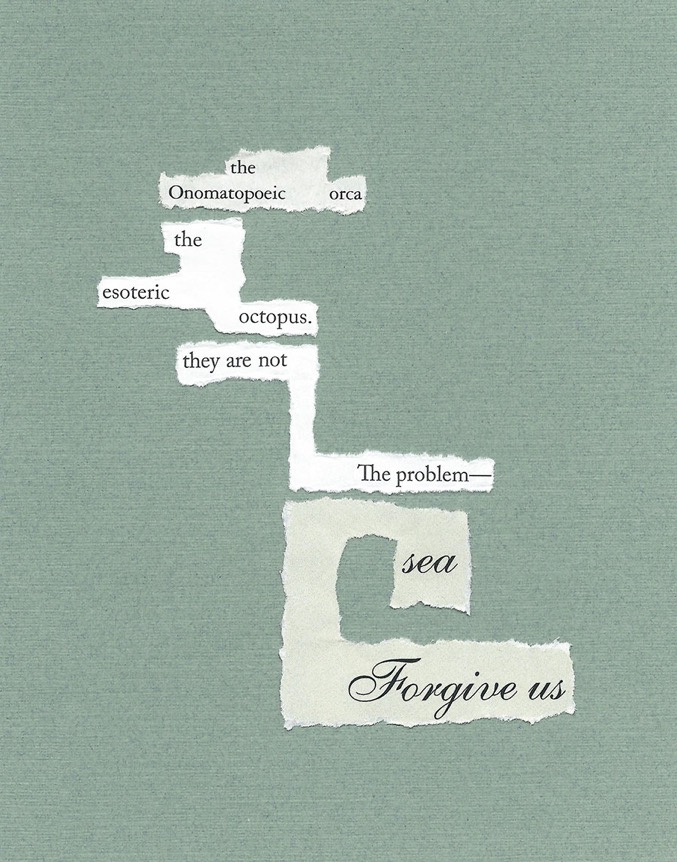
the Onomatopoeic
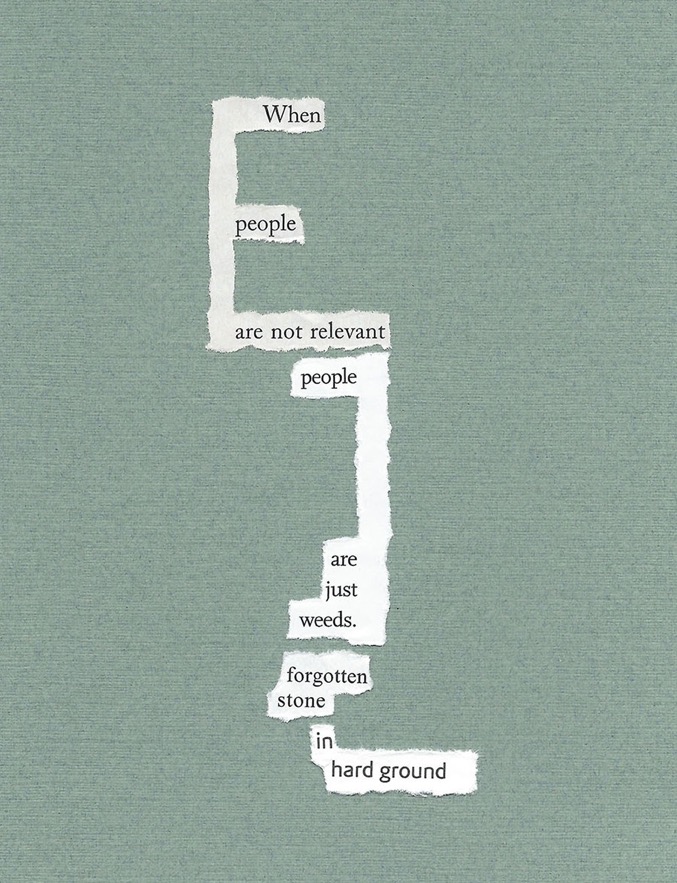
When people
Notes:
These pieces respond to a profound sense of loss—personal, familial, and environmental—and through the medium of found poetry attempt to (re)assemble a coherent narrative.
These visual poems are from an ongoing series of collages (2400+) built from phrases created unintentionally through the accident of magazine page design. Each contiguous fragment of text (roughly the equivalent of a poetic line) is entirely removed from its original sense and syntax. The text is not altered (except for the occasional deletion of prefixes, suffixes, or punctuation) and includes no attributable phrases. The lines of each collage are, in most cases, sourced from different magazines.
Bio:
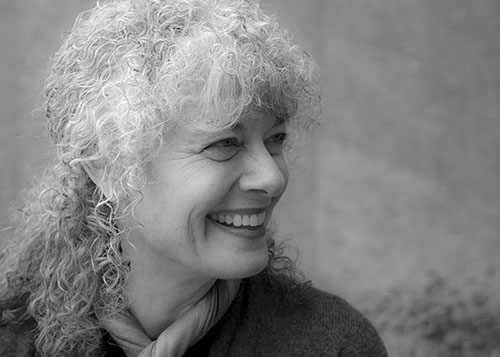 J.I. Kleinberg’s visual poems have been published in print and online journals worldwide. An artist, poet, freelance writer, and three-time Pushcart and Best of the Net nominee, she lives in Bellingham, Washington, USA, and on Instagram @jikleinberg.
J.I. Kleinberg’s visual poems have been published in print and online journals worldwide. An artist, poet, freelance writer, and three-time Pushcart and Best of the Net nominee, she lives in Bellingham, Washington, USA, and on Instagram @jikleinberg.
Ysabel Y. Gonzalez
Origins
Lucia, purveyor of ripe mangoes, overseer of rivers,
begot Hilda, priestess, dreamer, whisperer, gem keeper,
who begot her only daughter. Named for royalty,
I’ve been a slave to invention, newness, unyielding boxes
holding a body which I’ll never get back—
young woman I wish I could claim but never owned.
That is her beauty: infinite reckless spiritualist in love with a God
that’s been kind.
The young woman was once a girl, friendless, but loved
by her mother and father like an animal who mouths their cub
by the scruffy neck. The girl did not know how to dress.
The girl did not know how to comb her hair. That is the price
you pay for loving pages in a book—you live messily.
But the girl knew other things: Disney and radio songs
and a bird in a pink cage that hissed through his bars. She loved
creating and storing alternate versions of stories in her brain.
Like that time during recess when the school boy walked up concrete steps
leading inside, leaned over and spit on her puffy coat. It was such a cold
day. Couldn’t the white have been snow on her shoulder?
And what of the way she walked? Hunched, hoping she would crumple,
her body disappearing into smallness, whiteness, plainness.
She imagined all the ways she could save her body from being looked at,
eyed, devoured. She knew, too young, how a body could get a woman
in trouble. It’s my fault for constructing myself this way was the pervasive
thought echoing in her little girl-brain.
The girl, the young woman, forgives herself and is hopeful,
like Disney, like radio songs, but not like the hissing bird. The woman
now, is forgetful. Remembers how to create, but forgets how to love
her body. Men used her to feel alive and she allowed it because
her mother’s advice, about love, was garbled,
words on the tip of her tongue she can’t quite recall.
She decides, this is the end
and surrounds herself with women.
Women who love her, guide her, pick her up and instruct her to be patient
until she can hear the music again, the words again, trust
her body again. Hear her mother. She does. It’s glorious,
and everything you’d imagine: angels’ iridescent wings flapping,
the earth rotating more quickly, and even—yes—soft kittens purring
on a pillow. It is raucous. It is peace.
Origins should never be taken lightly, they feed the ego or starve it,
creating a woman boundless or shackled. Sometimes, somewhere
in the middle. Ysabel was born to warrior women, but had to learn it all again,
the same lesson over and over like Caribbean water rushing in on sand,
drawing back to reveal creatures hiding in their shells.
When I evoke my start, I taste salt, it calms me. I taste power too,
rough boulders washed over by ocean, instructing me to be formidable,
believe in their rocky boldness.
This origin is for you—the believer, the rebel, the odd woman out.
Maybe yours is a little like mine—
daughter of a goddess, birthed with a bit of fire flickering from the eyes.
Chameleon or Thinking About My Mother the Sparrow
Chirrup caught in its jewel-throated song,
she is the sorrowful sparrow flitting above,
leading me although she doesn’t quite know the way.
This is no dream and I’m grateful
she’s flying and I can see her from the ground.
Sometimes I hear her story better
when I tilt my head slightly—
the sparrow’s melody is a siren. Now
a bruise. Blade rising. Now
a clue to how to move in this world,
sort of trembling (some say dancing).
Her music is my own and I inherit the achy
sword and swerve, even when I’m unsure it will serve me.
Every day my body morphs, colors rippling
over like tidal rainbow, giving me hope and exhaustion,
molding to the world as it holds my skin in its hands.
I take comfort in any spritely creature broken yet full of faith,
but especially this sparrow, who believes her spell will guide me to where
the universe needs me to stand. I’m right
where I’m supposed to be, mother, getting rained on.
The sun will dry me up, will fill
my cupped palms with light.
It is dawn again and I should rest from all this singing.
Sit with today. Tomorrow
will come and I’ll wonder, wander through it then.
Notes:
Origins. This poem holds in its hands two leading women in my life–my mother (living) and grandmother (who has passed), both of whom continue to guide me. Because of their ancestral inspiration, I feel fuller, happier–and 100% braver.
Chameleon or Thinking About My Mother the Sparrow: Chameleon is a persona I’ve developed who is constantly thinking about changing, shifting, and adapting to and with the world. Here she sits and thinks about her mother, who is different yet ancestrally, the same.
Bio:
 Newark, NJ native Ysabel Y. Gonzalez received her BA from Rutgers University, an MFA in Poetry from Drew University and works as the Assistant Director for the Poetry Program at the Geraldine R. Dodge Foundation. Ysabel has received invitations to attend VONA, Tin House, Ashbery Home School and BOAAT Press workshops. She’s a CantoMundo Fellow and has been published in Tinderbox Journal; Anomaly; Vinyl; Waxwing Literary Journal, and others. She is a Pushcart Prize nominee and the author of Wild Invocations (Get Fresh Books, 2019). You can read more at www.ysabelgonzalez.com.
Newark, NJ native Ysabel Y. Gonzalez received her BA from Rutgers University, an MFA in Poetry from Drew University and works as the Assistant Director for the Poetry Program at the Geraldine R. Dodge Foundation. Ysabel has received invitations to attend VONA, Tin House, Ashbery Home School and BOAAT Press workshops. She’s a CantoMundo Fellow and has been published in Tinderbox Journal; Anomaly; Vinyl; Waxwing Literary Journal, and others. She is a Pushcart Prize nominee and the author of Wild Invocations (Get Fresh Books, 2019). You can read more at www.ysabelgonzalez.com.
Mariana Mcdonald
Post Mortem
Dissection of aorta:
the severing of the soul
from all that once was
blood and bone
and in the cleft
made whole,
in spirit
and god’s company.
Thus hallowed,
yet no good
for one who wants
to feel her hand
in all its
bone and blood
Notes:
Our ancestors have all transitioned at some moment from a being planted on the earth, to a spirit of the earth. When the ancestor is a beloved family member, the transition can be wrenchingly painful. My sister died suddenly and unexpectedly when her aorta tore apart like an old tire, plunging me into the depths of grief. “Post Mortem” expresses the profound longing that we the living have for the dead.
Bio:
 Mariana Mcdonald is a poet, writer, scientist, and activist. Her work has appeared widely, including poetry in Crab Orchard Review, Lunch Ticket, and The New Verse News; fiction in About Place Journal and Cobalt; and creative nonfiction in Longridge Review and InMotion._ She co-authored Dominga Rescues the Flag/Dominga rescata la bandera, about Black Puerto Rican heroine Dominga de la Cruz. Mcdonald lives in Atlanta.
Mariana Mcdonald is a poet, writer, scientist, and activist. Her work has appeared widely, including poetry in Crab Orchard Review, Lunch Ticket, and The New Verse News; fiction in About Place Journal and Cobalt; and creative nonfiction in Longridge Review and InMotion._ She co-authored Dominga Rescues the Flag/Dominga rescata la bandera, about Black Puerto Rican heroine Dominga de la Cruz. Mcdonald lives in Atlanta.
About the Poetry Editor
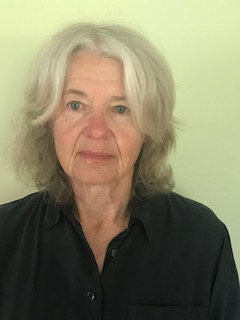
Melissa Kwasny is the author of six books of poetry, most recently Where Outside the Body is the Soul Today (University of Washington Press Pacific Northwest Poetry Series) and Pictograph (Milkweed Editions), as well as a prose collection, Earth Recitals: Essays on Image and Vision (Lynx House Press). She is the editor of Toward the Open Field: Poets on the Art of Poetry 1800–1950 (Wesleyan University Press) and co-editor, with M.L. Smoker, of the anthology I Go to the Ruined Place: Contemporary Poets in Defense of Global Human Rights (Lost Horse Press). Recently published by Trinity University Press, Putting on the Dog: The Animal Origins of What We Wear is her first book of nonfiction. She is currently serving as Montana Poet Laureate, a position she is sharing with M.L. Smoker.
To comment on this article, please click here.
Copyright © 2014-2021 Dark Matter: Women Witnessing - All rights reserved to individual authors and artists.
Email: Editor@DarkMatterWomenWitnessing.com
Please report any problems with this site to webmaven@DarkMatterWomenWitnessing.com
